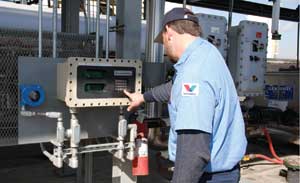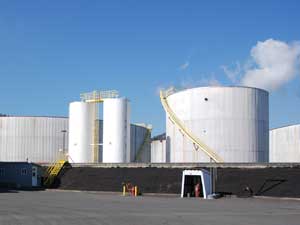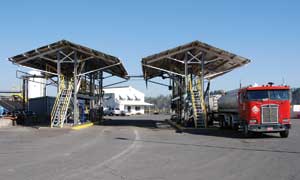Portland's Progressive Terminal




April 25, 2007
BY Ron Kotrba
Oregon is brimming with biofuels activity and McCall Oil and Chemical Corp. is positioned to be the state's premier distributor. Portland-Oregon's largest city-is home to more than a half-million people and is surrounded by millions more. It's also on the verge of implementing a citywide renewable fuels standard (RFS) that requires all retail diesel fuel sold in the city to be B5. The fuels standard goes into effect this fall, according to Tomas Endicott, cofounder and managing partner of Sequential Biofuels, a biodiesel marketer based in Eugene, Ore. While a citywide retail B5 mandate in Portland may not amount to serious volume, there's more.
The Oregon state legislature is in the midst of pushing through a progressive bill seeking to establish biofuels standards for both ethanol and biodiesel-one that's been years in the making. When instate biodiesel production reaches 5 MMgy, part one of the two-part mandate would go into effect, requiring B2 in all diesel fuel sold throughout Oregon. That 5 MMgy of biodiesel must come from regional sources in Washington, Oregon and Montana. Part two would entail increasing the B2 mandate to B5 when instate production of biodiesel reaches 15 MMgy.
"I've been involved in developing this legislation since 2002," Endicott says, noting that he's worked with the governor's office and state legislators to get this bill off the ground and into the law books. At press time, the House had already passed the legislation. Its fate now lies in the hands of the Senate. "We're all confident the Senate will pass it and the governor will sign it," he tells Biodiesel Magazine. If expectations are realized and the statewide RFS becomes law, the phase-one B2 mandate alone would create the demand for 15 MMgy of biodiesel in the state; the phase-two B5 requirement would raise the volume of biodiesel needed to 35 MMgy.
"Portland terminals distribute 70 percent of Oregon's fuel supply," Endicott says. The city has approximately seven terminals handling that majority share. "McCall Oil and Chemical is probably the only diesel-only terminal in Portland-maybe all of Oregon," he says. It's also the only Portland-based terminal to injection-blend biodiesel.
McCall History and Presence
"McCall started in 1938 as a service station, which grew into a heating oil [distributing] company," McCall Oil CEO Jim Charriere says. "At one time, it was the largest heating oil company on the West Coast, with around 35 million gallons in heating oil home deliveries." In 1974, McCall Oil began construction on its Portland terminal on the Willamette River, which flows into the Columbia River and out to the Pacific Ocean. Portland is an inland deep-water port that is able to handle large Pana max ships. Also, the terminal has access to the Olympic Pipeline, which runs through a 300-mile corridor from Ferndale, Wash., to Portland. "Our terminal is on an 18-acre site, and we have a million barrels (42 million gallons) of storage capacity, three-quarters of which is heated," Charriere says.
McCall's Portland terminal has a high volume of heated storage because of its asphalt business, something that has developed and become one of its primary functions. "Asphalt is the very viscous oil that makes up 6 percent of what you see when you look at roads but represents 50 percent of the cost," Charriere says. Asphalt is sold hot-350 degrees Fahrenheit-and requires a source of heat for proper storage. "Heat's not a problem here … We have two natural gas boilers," Charriere says. Excess heat from the boilers is routed to other tanks in the terminal, providing enough warmth to store B100 at 50 degrees Fahrenheit, which helps avoid gelling.
McCall hasn't carried biodiesel for long. Its decision to start was intertwined with many things: the state-created demand on the horizon, the terminal's preexisting heating capacity and the installation of an injection blending system for dye-something used at many terminals, but rarely for biodiesel blending. "With the changes in diesel fuel specifications, we had to make changes to our load rack," Charriere says. "We were already putting in an injection system for dye injection of lubrication and conductivity additives." The two injection systems are similar.
Another driver behind the decision to begin blending biodiesel was the state tax credits available to expand alternative fuels infrastructure. It's a 35 percent credit spread out over five years: 10 percent for each of the first two years, followed by 5 percent per year for the remaining three years. All things considered, the opportunity to begin blending biodiesel-and blending it accurately-was too good to pass up.
The precision provided by injection blending, also referred to as ratio or proportional blending, is said to be far superior to that of splash blending, yet the latter is still the most common blending method. "When we decided to install this system, most blenders practiced splash blending-where they put the diesel fuel in the tank and splash some biodiesel on top, then drive it around and hope it all mixes up," Charriere says. "With our automated blending system, we can blend anything from B2 to B99 at 400 gallons per minute."
The unit is an Accuload model. "The driver pulls up, swipes their card [and] chooses their product whether that's on-road biodiesel, dyed ultra-low sulfur biodiesel [blend], or higher sulfur-dyed biodiesel [blends]," Charriere says. Ted McCall, whose grandfather started the company and who is currently vice president of environmental and risk management, says the resellers who use McCall Oil's automated blending system are very pleased. "They appreciate what we have in place," McCall says. "It's very user-friendly."
Sequential Supplier
McCall's B100 is supplied by biodiesel marketer Sequential Biofuels, which also has a stake in SeQuential-Pacific Biodiesel, Salem, Ore.-based plant designed and built by Pacific Biodiesel. The facility is capable of using multiple feedstocks, much of which is waste cooking oil from the surrounding regions. Endicott says the plant will expand to 5 MMgy beginning in late summer or early fall. If all goes according to expectations with the measure now in the state Senate, the expansion would trigger the B2 mandate once completed. As a marketer, Sequential Biofuels penetrates Pacific Northwest markets. It has 30 sites in Oregon alone offering B20 or B99.
With the expected mandates already in the pipeline, Endicott tells Biodiesel Magazine that the other petroleum distributors, terminals and majors ought to be concerned about equipping themselves with the means to blend biodiesel. "Absolutely they should be concerned," Endicott says. "We need the ability to distribute B5 here in Portland by the fall." One of the attributes that attracted his company to McCall Oil, the only terminal Sequential works with, was that it was a family-owned business. "Also, they were more accessible than the Chevrons, the Shells and the Conoco Phillips," he says. "Through biodiesel we had a connection. We had our production facility on line already, and supplying to McCall was an efficient way to get biodiesel into the distribution chain in Portland."
Biodiesel at the McCall terminal in Portland is housed in one large storage tank with the capacity to hold 10,000 barrels (420,000 gallons), or two smaller 700-barrel (30,000-gallon) tanks. "This allows us to receive product in one tank and test it to assure product quality while shipping out of another one," Charriere says.
This family-owned terminal has been of interest to major players in the fuel industry. They are looking to McCall Oil's automated biodiesel injection-blending system and heated storage configuration for insight on establishing the wherewithal to do the same. Even some of the big biodiesel producers are interested in working with McCall Oil. "Cargill has been calling us direct," McCall says. "Other big [biodiesel] suppliers are interested in working with us, too." Moreover, biodiesel blend sales have been picking up steadily for McCall Oil since the terminal began carrying tailor-blended biodiesel. "We move a lot of B5 and B20," he says.
Major oil companies with terminals in Portland, like Conoco Phillips and Kinder Morgan Inc., have been involved with city officials and logistics experts for months to determine what would be the best approach to implement the citywide B5 mandate. Charriere tells Biodiesel Magazine that "it's flattering" to have the majors peering into his company's setup for ideas. Speaking to McCall Oil's longevity and string of accomplishments through nearly 70 years of operations, he says, "I would say it's because of our ability to remain nimble in the marketplace."
Ron Kotrba is a Biodiesel Magazine staff writer. Reach him at rkotrba@bbibiofuels.com or (701) 746-8385.
The Oregon state legislature is in the midst of pushing through a progressive bill seeking to establish biofuels standards for both ethanol and biodiesel-one that's been years in the making. When instate biodiesel production reaches 5 MMgy, part one of the two-part mandate would go into effect, requiring B2 in all diesel fuel sold throughout Oregon. That 5 MMgy of biodiesel must come from regional sources in Washington, Oregon and Montana. Part two would entail increasing the B2 mandate to B5 when instate production of biodiesel reaches 15 MMgy.
"I've been involved in developing this legislation since 2002," Endicott says, noting that he's worked with the governor's office and state legislators to get this bill off the ground and into the law books. At press time, the House had already passed the legislation. Its fate now lies in the hands of the Senate. "We're all confident the Senate will pass it and the governor will sign it," he tells Biodiesel Magazine. If expectations are realized and the statewide RFS becomes law, the phase-one B2 mandate alone would create the demand for 15 MMgy of biodiesel in the state; the phase-two B5 requirement would raise the volume of biodiesel needed to 35 MMgy.
"Portland terminals distribute 70 percent of Oregon's fuel supply," Endicott says. The city has approximately seven terminals handling that majority share. "McCall Oil and Chemical is probably the only diesel-only terminal in Portland-maybe all of Oregon," he says. It's also the only Portland-based terminal to injection-blend biodiesel.
McCall History and Presence
"McCall started in 1938 as a service station, which grew into a heating oil [distributing] company," McCall Oil CEO Jim Charriere says. "At one time, it was the largest heating oil company on the West Coast, with around 35 million gallons in heating oil home deliveries." In 1974, McCall Oil began construction on its Portland terminal on the Willamette River, which flows into the Columbia River and out to the Pacific Ocean. Portland is an inland deep-water port that is able to handle large Pana max ships. Also, the terminal has access to the Olympic Pipeline, which runs through a 300-mile corridor from Ferndale, Wash., to Portland. "Our terminal is on an 18-acre site, and we have a million barrels (42 million gallons) of storage capacity, three-quarters of which is heated," Charriere says.
McCall's Portland terminal has a high volume of heated storage because of its asphalt business, something that has developed and become one of its primary functions. "Asphalt is the very viscous oil that makes up 6 percent of what you see when you look at roads but represents 50 percent of the cost," Charriere says. Asphalt is sold hot-350 degrees Fahrenheit-and requires a source of heat for proper storage. "Heat's not a problem here … We have two natural gas boilers," Charriere says. Excess heat from the boilers is routed to other tanks in the terminal, providing enough warmth to store B100 at 50 degrees Fahrenheit, which helps avoid gelling.
McCall hasn't carried biodiesel for long. Its decision to start was intertwined with many things: the state-created demand on the horizon, the terminal's preexisting heating capacity and the installation of an injection blending system for dye-something used at many terminals, but rarely for biodiesel blending. "With the changes in diesel fuel specifications, we had to make changes to our load rack," Charriere says. "We were already putting in an injection system for dye injection of lubrication and conductivity additives." The two injection systems are similar.
Another driver behind the decision to begin blending biodiesel was the state tax credits available to expand alternative fuels infrastructure. It's a 35 percent credit spread out over five years: 10 percent for each of the first two years, followed by 5 percent per year for the remaining three years. All things considered, the opportunity to begin blending biodiesel-and blending it accurately-was too good to pass up.
The precision provided by injection blending, also referred to as ratio or proportional blending, is said to be far superior to that of splash blending, yet the latter is still the most common blending method. "When we decided to install this system, most blenders practiced splash blending-where they put the diesel fuel in the tank and splash some biodiesel on top, then drive it around and hope it all mixes up," Charriere says. "With our automated blending system, we can blend anything from B2 to B99 at 400 gallons per minute."
The unit is an Accuload model. "The driver pulls up, swipes their card [and] chooses their product whether that's on-road biodiesel, dyed ultra-low sulfur biodiesel [blend], or higher sulfur-dyed biodiesel [blends]," Charriere says. Ted McCall, whose grandfather started the company and who is currently vice president of environmental and risk management, says the resellers who use McCall Oil's automated blending system are very pleased. "They appreciate what we have in place," McCall says. "It's very user-friendly."
Sequential Supplier
McCall's B100 is supplied by biodiesel marketer Sequential Biofuels, which also has a stake in SeQuential-Pacific Biodiesel, Salem, Ore.-based plant designed and built by Pacific Biodiesel. The facility is capable of using multiple feedstocks, much of which is waste cooking oil from the surrounding regions. Endicott says the plant will expand to 5 MMgy beginning in late summer or early fall. If all goes according to expectations with the measure now in the state Senate, the expansion would trigger the B2 mandate once completed. As a marketer, Sequential Biofuels penetrates Pacific Northwest markets. It has 30 sites in Oregon alone offering B20 or B99.
With the expected mandates already in the pipeline, Endicott tells Biodiesel Magazine that the other petroleum distributors, terminals and majors ought to be concerned about equipping themselves with the means to blend biodiesel. "Absolutely they should be concerned," Endicott says. "We need the ability to distribute B5 here in Portland by the fall." One of the attributes that attracted his company to McCall Oil, the only terminal Sequential works with, was that it was a family-owned business. "Also, they were more accessible than the Chevrons, the Shells and the Conoco Phillips," he says. "Through biodiesel we had a connection. We had our production facility on line already, and supplying to McCall was an efficient way to get biodiesel into the distribution chain in Portland."
Biodiesel at the McCall terminal in Portland is housed in one large storage tank with the capacity to hold 10,000 barrels (420,000 gallons), or two smaller 700-barrel (30,000-gallon) tanks. "This allows us to receive product in one tank and test it to assure product quality while shipping out of another one," Charriere says.
This family-owned terminal has been of interest to major players in the fuel industry. They are looking to McCall Oil's automated biodiesel injection-blending system and heated storage configuration for insight on establishing the wherewithal to do the same. Even some of the big biodiesel producers are interested in working with McCall Oil. "Cargill has been calling us direct," McCall says. "Other big [biodiesel] suppliers are interested in working with us, too." Moreover, biodiesel blend sales have been picking up steadily for McCall Oil since the terminal began carrying tailor-blended biodiesel. "We move a lot of B5 and B20," he says.
Major oil companies with terminals in Portland, like Conoco Phillips and Kinder Morgan Inc., have been involved with city officials and logistics experts for months to determine what would be the best approach to implement the citywide B5 mandate. Charriere tells Biodiesel Magazine that "it's flattering" to have the majors peering into his company's setup for ideas. Speaking to McCall Oil's longevity and string of accomplishments through nearly 70 years of operations, he says, "I would say it's because of our ability to remain nimble in the marketplace."
Ron Kotrba is a Biodiesel Magazine staff writer. Reach him at rkotrba@bbibiofuels.com or (701) 746-8385.
Advertisement
Advertisement
Upcoming Events





